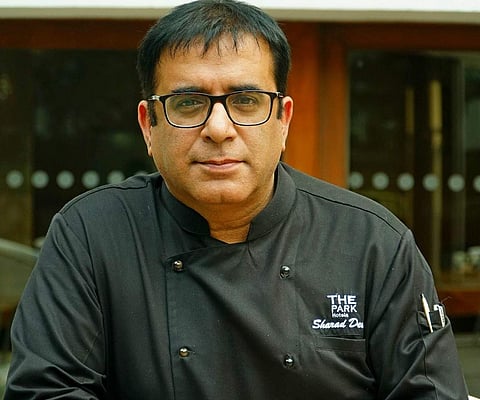
- LIFESTYLE
- FASHION
- FOOD
- ENTERTAINMENT
- EVENTS
- CULTURE
- VIDEOS
- WEB STORIES
- GALLERIES
- GADGETS
- CAR & BIKE
- SOCIETY
- TRAVEL
- NORTH EAST
- INDULGE CONNECT

I was born on the day of Eid ul Fitr. My father’s closest friend then, Ali uncle, nick named me ‘Eidu’. My tryst with Eid became more prominent when I became a chef. In 1995 when I was train-
ing under the legendary Chef Imtiaz Qureshi, I had to prepare a different snack each day for the
whole month of Ramzan. Much later, I realised that it was all part of a special learning.
One interesting thing about Eid is that every year it shifts back about 10 days and thus the cycle is repeated after every 36 years. When I came to Kolkata in 2007, Eid was in October and now it is in June. But I was surprised to hear from some of my close Muslim friends and chefs that Eid or Ramzan food doesn’t change according to seasons. So, the haleem, fruits, dates, pakodas, chana chaat and other such delicacies are always there for Iftar. What changes is the ratio of the intake of dishes like sherbet or nihari. On the day of Eid biryani, quorma, seviyan or sheer khurma has to be there. Dawats are usually at homes. But on days after, people love eating out. The Park was the first hotel in the city to start a Ramadan/ Eid walk, where I would take a bunch of gastrnomes for a walk around different parts of the city, exploring food especially prepared by the iconic restaurants and street stalls.
Since Eid ul Fitr is also called meethi eid, most of the popular dishes from across the globe are sweet. The sheer khurma is equally popular in Pakistan, Bangladesh, and Afghanistan. Lokum or what we commonly call Turkish delights are popular in India as well. In America, a new trend has come in -— spiced cookies cut in the shape of mosques or crescent moon. Eid cookies are also popular in Syria and Lebanon and are called Maamoul. They are stuffed with dates and dry fruits. In North Africa (Morocco and Algeria) Tagine meat is popular. In Ethiopia they have chicken curry called Doro Wat. Russia has a lamb or beef dumpling called Manti, probably a Chinese influence. Afghanistan, though a predominantly meat-eating country, has a popular vegetarian dish called Bolani — bread stuffed with root vegetables and lentils. Indonesia has sweets called Lapis Legit, very similar to Bebinka from Goa or the Dutch layer cakes. In Indonesia and Malaysia another popular dish is Beef Rengdang.
I have experienced Ramadan food in five Indian cities namely Delhi, Lucknow, Hyderabad, Bhopal, Mumbai and Kolkata. You will find some common dishes like biryani, qorma, haleem, seviyan, sheer khurma, apart from the dishes unique to each city. I would suggest you to it try watermelon roohafza milk sherbet and jalebi in Delhi; tundey kebab, kakori and tehri in Lucknow; Irani chai, Karachi biscuit and khubani ka meetha in Hyderabad; poha jalebi, bade key kebab, barfi rasmalai, lassi and paan in Bhopal; mutton samosa, kebab oao, baida roti and malpua in Mumbai; and, kati roll, keema ghooghni, mutton chaap and falooda in Kolkata.
So if you are a food explorer, you should try out the Iftar and Eid food of the city you are in. Few Eid moons later, you too will have a food story to share and if you already have one, I would love to hear it.
You can write to Chef Sharad at sdewan@theparkhotels.com